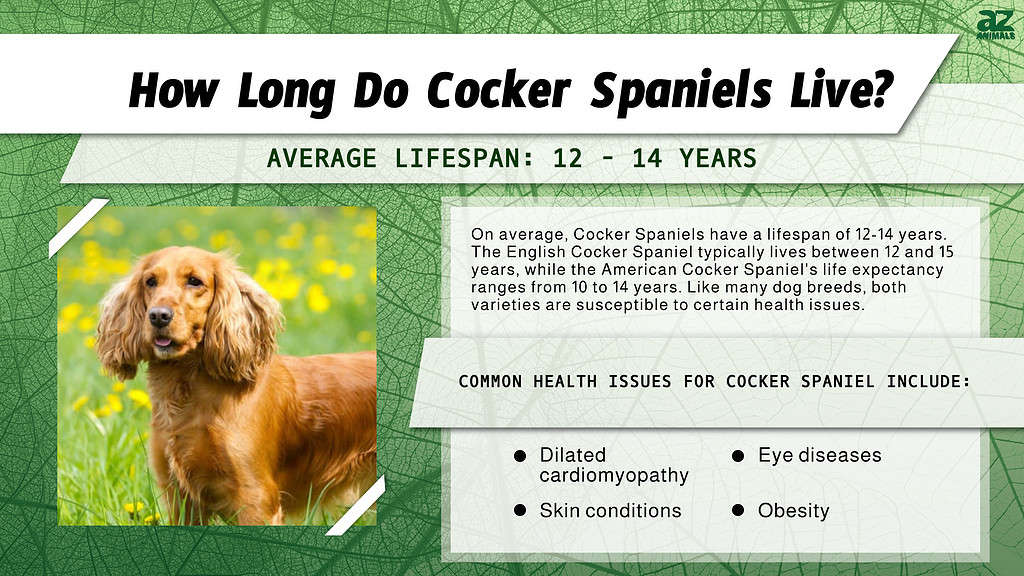
Cocker Spaniels are classified between two different spaniel dogs: the American Cocker Spaniel and the English Cocker Spaniel. They are absolutely adorable with their long floppy ears and their wiry coat. Cocker Spaniels are also one of the most friendly and eager to please their owners however they can. This is why they have continued to be a popular pet choice for many dog owners. As a companion dog, you’ll never grow bored with your Cocker Spaniel around.
How much do you know about this furry pup, whose original purpose was to hunt? Here are some fun and intriguing facts about them, such as the Cocker Spaniel lifespan and how you, as a dog owner, may help them live longer.
How Long Do Cocker Spaniels Live?

Cocker Spaniels live between 12 to 14 years.
©Mike Baird / CC BY 2.0, Flickr – License
The average Cocker Spaniel’s lifespan is between 12-14 years. The English Cocker Spaniel has an average lifespan of 12 to 15 years, while the American Cocker Spaniel’s life expectancy is 10 to 14 years. As with most canine breeds, both dogs are prone to a few health issues. They are also predisposed to certain genetic disorders. These all play a role in the longevity of each Cocker Spaniel.
A cocker spaniel in Sherman Oaks, California, might have been the world’s oldest living dog. On New Year’s Day, Uno turned 22 — 110 in human years. However, according to the 2010 Guinness Book of World Records, a Dachshund mix called Chanel is still formally recognized as the world’s oldest living dog at 21 years old.
According to Sherman Oaks ophthalmologist Norm Steinberg, Uno is the oldest dog in the world unofficially. Since he was not registered with the American Kennel Club, there are no records of his birth.
Let’s take a closer look at the cocker spaniel life cycle now that we’ve gained a better understanding of their lifespan.
The Average Cocker Spaniel Life Cycle
Cocker Spaniels are fun and loving dogs that make for great companions. If you’ve ever been curious how they go from sweet puppies to regal adults, then we’ve got the rundown for you.
Birth
At birth, Cocker Spaniel puppies spend the majority of their time resting and putting all of their energies on growing. They are born with their eyes shut and their ears closed. This means that they can’t see or hear. They require milk every two hours to aid with their rapid development.
Puppies
Two to four weeks is a transitional period when their eyes open, and they begin to stand. They learn to be autonomous, play with their littermates, and control their body temperature during the third week. Puppies fight between the ages of four and six months, demonstrating fear, aggressiveness, and testing boundaries, as well as experiencing territorial difficulties. At this moment, these actions are normal and pose no danger. They have emotional immaturity similar to adolescence. Females may have their first period of heat.
Adulthood
Cocker Spaniels are considered fully mature at around 12-18 months of age. They attain their maximum weight by 24 months of age and may maintain it for the rest of their lives if they exercise and eat healthily. At this stage of the life cycle, your Cocker Spaniel has developed their personality and core traits.
What Factors Impact The Cocker Spaniel Lifespan

Cocker Spaniels are threatened by a number of health issues.
©Labrador Photo Video/Shutterstock.com
Many Cocker Spaniels have been kept as family pets because of their even temperament, beautiful coat, and aristocratic demeanor. Over-breeding to fulfill the demand for this beautiful breed has had a significant influence on general health and the Cocker Spaniel lifespan over the past several years.
Some of the most significant factors that impact the Cocker Spaniel’s longevity include:
- Dilated cardiomyopathy: Dilated cardiomyopathy (DCM) is a cardiac muscle condition that causes the heart to weaken and expand. DCM often affects the left and right sides of the heart. Cocker Spaniels are at risk for this heart condition, so pay attention to any rapid labored breathing.
- Eye diseases: Cocker Spaniels are predisposed to acute closed-angle glaucoma. Redness of the eyeball, cloudiness of the cornea giving the eye a blue appearance, semi-dilated pupil, squinting, copious tears, hanging the head down, and loss of vision are all symptoms.
- Skin conditions: As a result of their environment, Cocker Spaniel dogs are one of the breeds most commonly affected by skin conditions and allergies. They are prone to seborrhea and dermatitis, two disorders that can create a nasty odor and itchy, greasy, flaky skin.
How To Extend The Life Of Your Cocker Spaniel

Cocker Spaniels need regular exercise and training to live a healthy life.
©Olga Aniven/Shutterstock.com
As our fluffiest family member, our dogs mean the world to us. That’s why, as dog owners, we want to know everything we can do to extend our best friend’s life. While certain factors are out of our control, there are still several that we can have a helping hand in.
The best ways to help extend the life of your pooch are:
- Feeding them a healthy diet: Cocker Spaniels like food, and because they quickly form a tight attachment with the person who feeds them, it is critical that you keep an eye on their weight. Make sure to feed your dog high-quality, nutritional dog food. When deciding meal quantities for your Cocker Spaniel, consider their size, age, and activity level.
- Engaging in exercise and training: Cocker Spaniels are eager to learn and clever dogs, making training them a delight. Positive reinforcement and obedience training work effectively for them. Cocker Spaniels should engage in gentle exercise for the first six months of their life. Then you may introduce more thrilling walks into their regular schedule.
- Brushing their teeth: Brushing your Cocker Spaniel’s teeth on a regular basis can prevent tartar and plaque buildup, keeping their gums and teeth healthy. If you do not clean your dog’s teeth, they may develop dental problems such as tooth decay, which can lead to infection and raise your dog’s risk of heart disease.
The photo featured at the top of this post is © iStock.com/Bigandt_Photography
Ready to discover the top 10 cutest dog breeds in the entire world?
How about the fastest dogs, the largest dogs and those that are -- quite frankly -- just the kindest dogs on the planet? Each day, AZ Animals sends out lists just like this to our thousands of email subscribers. And the best part? It's FREE. Join today by entering your email below.
Thank you for reading! Have some feedback for us? Contact the AZ Animals editorial team.







